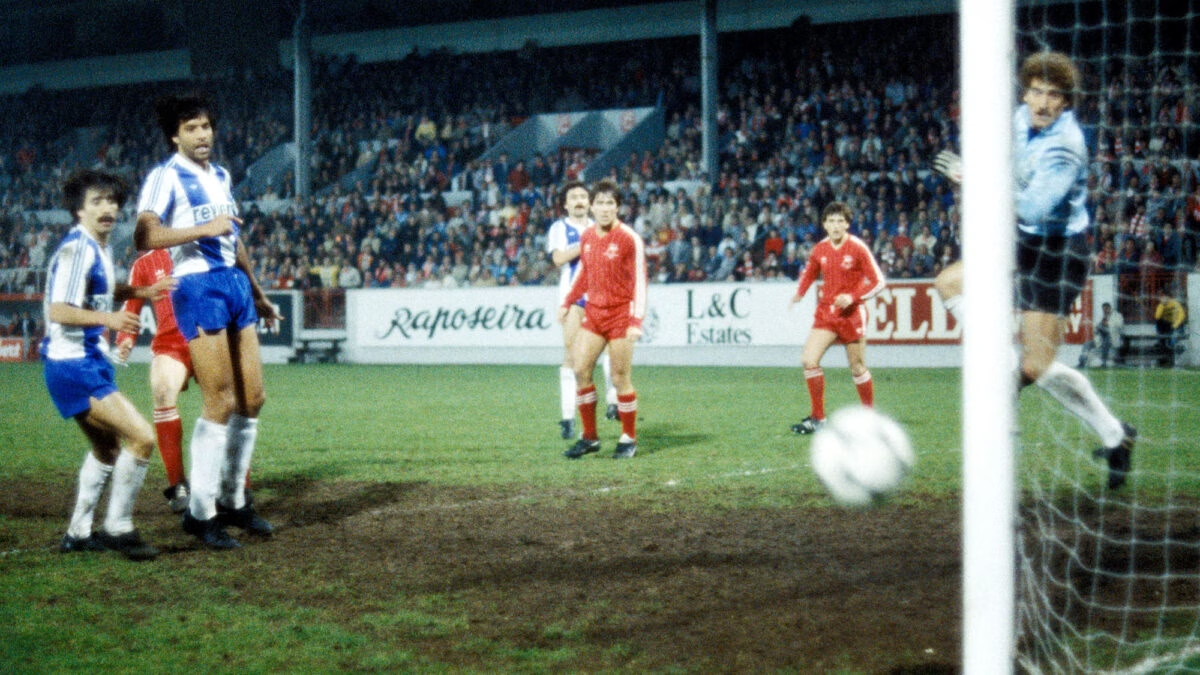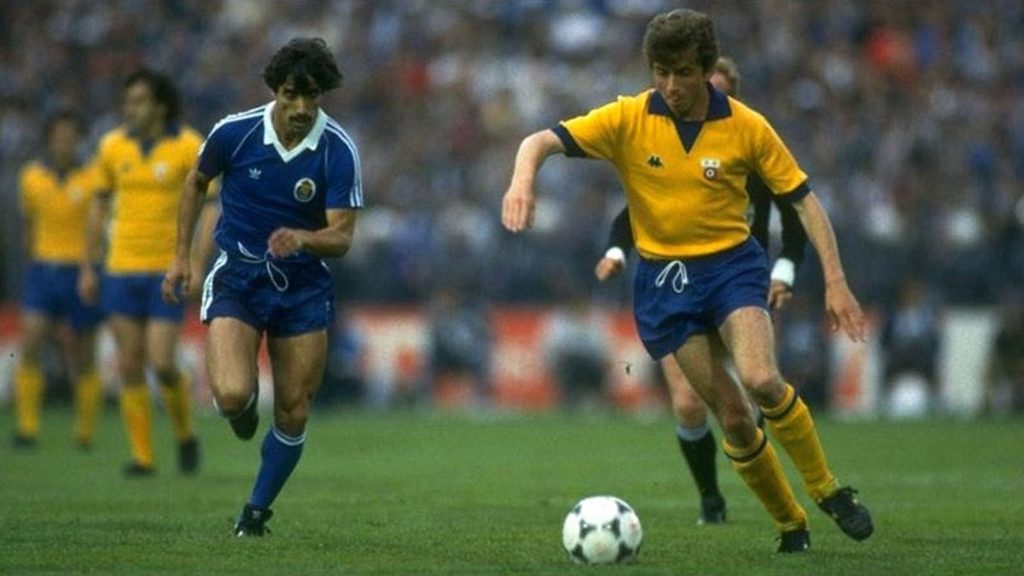News

1984 | The Final That Never Was
For those intrepid Aberdeen fans who booked hotel rooms in Basle for the 16th May 1984, it was not done on a whim.
Aberdeen were due to face Portuguese side Porto in defence of their ECWC crown for a place in the final in the St Jakob Stadium in Basle.
The Dons as reigning European Cup Winners Cup holders were favourites to reach the final. There was the additional prospect of an all-British final as Manchester Utd were facing Juventus in the other semi-final.

For Aberdeen to be in amongst such exalted company may be seen as fantasy football to the younger generation, but not only were Aberdeen worth their place at Europe’s top table, they were installed as the bookies favourites to become the first team to retain the Cup Winners Cup after the semi final draw was made.
The Dons had eased past Akranes of Iceland and Beveren from Belgium in the opening two rounds. As holders and one of the top seeded sides in the competition, Aberdeen did not face a really tough test until they came up against Hungarian side Ujpest Dozsa in the quarter finals.
A sensational 3-0 win at Pittodrie in the return leg put Aberdeen through. Former Dons boss Mark McGhee was the hero as his hat trick made the difference after Aberdeen had come away from Budapest trailing 2-0 from the first game. While Aberdeen were fighting back they were joined by an impressive Manchester United side in the last four.
The Old Trafford side trailed 2-0 from their quarter final clash with Barcelona in the Camp Nou, only to turn the tie round in a sensational 3-0 win in Manchester. Manager Ron Atkinson was jubilant as he watched his team knock out the pre-tournament favourites; “I always felt we had it in us to beat Barcelona. They knew they were fortunate to take a two-goal lead from Spain, so I knew if we could get amongst them early on we would have a chance. As it turned out we were never in danger of losing out.
“Now we have a semi final against another famous side in Juventus. They will not fancy coming here and the Italians are fearful of British opposition. You never know with Aberdeen in the other semi final, there could be an all-British final in Switzerland. That would be something else.”
Aberdeen manager Alex Ferguson was also excited at the possibility of an all-British battle in Basle although he was wary of the Porto challenge; “Porto are an emerging team with some talented players in their side. The first game over there will be vital. If we can take something from that then I would fancy us finishing the tie at Pittodrie. We fear nobody and we think we can take any side on in Aberdeen.”

In fact, when the semi-finals for the European Cup, European Cup, Uefa Cup and Cup Winners’ Cup began in April 1984, there was a chance all three finals would be the exclusive property of British clubs. It was an exciting prospect but it wasn’t to be.
Alex Ferguson’s counterpart in Portugal was not best pleased that his side came out in the draw against Aberdeen.
Antonio Morais was the manager in charge of the Portuguese side and he would rather have faced either of the other two possible; “To face the holders will be a huge task for us. We know all about the strength of the Scots; they are a formidable side with a nice balance about them. They have beaten far bigger teams than Porto in the past so they will be favourites. We will have to take a lead to Scotland or it will be an impossible journey for us.”
Aberdeen knew all about their opponents and along the way to reaching the semi final, Porto had beaten Rangers in the second round, and they never really scaled the heights as such; in all of their ties against Zagreb, Rangers and Shaktar Donetsk, they have never won any tie by more than one goal.
Far from being a free-flowing team; they were a tough combine and their style went against the traditional flair normally associated with Portuguese teams. Porto though have nine players from the Portugal team that would go on to reach the semi-finals of Euro 84.
There was no doubt that Aberdeen were the team they all wanted to avoid, but in that first leg in Oporto on 11th April 1984; it was Aberdeen who were up against it. Backed by a vociferous 65,000 crowd a goal from Gomes after 14 minutes was enough to give Porto a lead to take to Scotland. Aberdeen rode their luck on occasion and also had to contend with a Rumanian referee who later admitted some years later that he took bribes during his career. Meanwhile at Old Trafford the dream British final looked to be a long shot after Juventus held Manchester Utd to a 1-1 draw.
Despite Aberdeen still looking to claw back that deficit in the return, on a foggy night at Pittodrie the eerie atmosphere fell flat as Porto scored a vital away goal to end Aberdeen dreams of retaining their trophy.
Juventus completed their win with a 1-0 success in Turin to set up a Juventus Porto final in Switzerland. For Porto it was their first European final and they went down 2-1 to an experienced Juventus side in the final in Basle on 16th May 1984.
Back in Aberdeen three days later the Dons went on to defeat Celtic in the Scottish Cup Final at Hampden to complete a League and cup double for the first time in their history.
A glorious treble had eluded that great team for the second year in succession. But like the season before, only just.

The final in Basle was marred by controversial refereeing decisions, and a number of years later it was alleged that a Portuguese official had bribed Romanian Ion Igna ahead of the first leg of the semi-final between and Porto and Aberdeen.
Fernando Barata, the former coach of first division side Farense and president of third division club Imortal, announced in 1996 that he acted as a go-between to bribe Romanian referee lgna ahead of the first leg at the request of the Porto chairman, who has always denied the charge.
Despite a investigation into the Aberdeen game, we should point out the allegations were never proven and also there were no major controversial incidents of note during the 90 minutes.
In the second leg Aberdeen did have due cause to rue some of the decisions by Czechoslovakian referee Krchnak.
It did cast a shadow over what had happened in 1984.
The following season, so heavy was the burden of fixtures upon European Cup winners Liverpool that they could only find one date to contest the 1984 UEFA Super Cup with Juventus – and that was in Turin in January 1985.
A win on penalty kicks following a 1-1 draw against AS Roma had seen Liverpool crowned European champions for the third time in the summer of 1984, while Juventus had taken the UEFA Cup Winners’ Cup with that victory against FC Porto in Basel.
The scorer of what proved to be the winning goal in that game, Zbigniew Boniek, was to be Juventus’ hero in the truncated UEFA Super Cup final as well. The brilliant Polish international, who was once linked with a move to Pittodrie, opened the scoring in Turin after 39 minutes and beat Bruce Grobelaar for a second time after 79 minutes.
Without a customary second leg to defend their lead, that victory gave Juventus the UEFA Super Cup.
It was to be the last UEFA Super Cup match for two years. Juventus and Liverpool met again in the European Cup final on 29 May 1985, but the match at the Heysel Stadium in Brussels was rendered insignificant after crowd violence led to the tragic deaths of 39 supporters.
The game was played, with Michel Platini’s goal giving Juventus victory, but it was to be a hollow success. With hooliganism in England having reached its height, UEFA subsequently banned English clubs from Europe for five seasons (Liverpool were banned for longer) – which in turn saw the cancellation of the 1985 UEFA Super Cup final.
Liverpool’s local rivals Everton would have played Juventus in that game, having won the UEFA Cup Winners’ Cup, but the ban meant they never got the chance. The Italian side, meanwhile, understandably did not want to play the fixture.
A golden era of European football had come to an end. An era the Dons more than played a part in.

For the Record
The 33 entrants for the ECWC competition in 1983.84 were; Aberdeen (Holders), Nentori Tirana, SSW Innsbruck, SK Beveren, Spartak Varna, Famagusta, Dukla Prague, B1903 Nykobing, Magdeburg, Sligo Rovers, Manchester Utd, Haka, Paris SG, Cologne, AEK Athens, Ujpest Dozsa, Akranes, Juventus, Avenir Beggen, Valletta, Nijmegen, Glentoran, Brann Bergen, Lechia Gdansk, Porto, Rangers, Barcelona, Hammarby, Servette, Mersin, Shaktar Donetsk, Swansea, Dinamo Zagreb.
Spain, Scotland, England, Hungary, Finland, USSR, Portugal and Italy were represented by the quarter final stages.
A total of 193 goals were scored in the 63 ties played.
Some famous players graced the 1983.84 competition apart from the Aberdeen side with several Scotland stars in their line up. The likes of Juventus had Bonnini, Boniek, Gentile, Tardelli, Rossi and Michel Platini. Cologne had Harold Schumacher, Pierre Litbarski and Klaus Allofs. Barcelona had the likes of Victor, Alonso, Alberto and Bernd Schuster. Manchester Utd had Bryan Robson, Ray Wilkins, Mark Hughes, Norman Whiteside and Frank Stapleton. Also in the United ranks was former Don Arthur Graham.
Mark McGhee finished as joint top tournament scorer with five goals, shared with Shaktar pair Viktor Grachyev and Sergei Morozov.
There were also some top managers involved; apart from Alex Ferguson at Aberdeen, Giovanni Trapattoni was in charge of eventual winners Juventus, while Ron Atkinson was manager at Old Trafford. At Barcelona Argentine World Cup boss Cesar Menotti was in control of the Catalan giants.
No side in the history of the European Cup Winners Cup managed to retain the trophy during it’s 39-years of existence. Italian giants AC Milan came nearest to achieving that feat in 1974 when they went down to Magdeburg in the Final in Rotterdam after winning the trophy a year earlier against Leeds Utd. Belgian club Anderlecht also came close after reaching three finals in succession in the 70’s, while both Arsenal and Paris St Germain reached successive finals in the 90’s.

